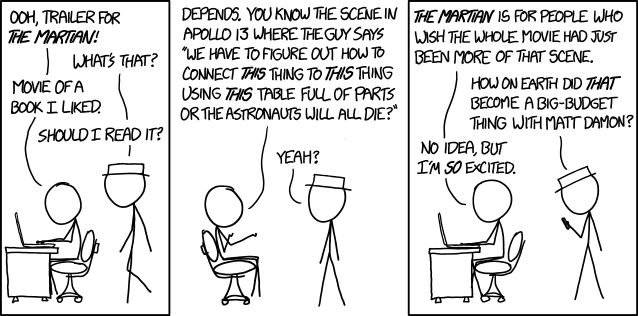Sometimes, a lot of scientific and mathematical details in a work of fiction would turn readers off. In Andy Weir's first novel The Martian, the more specifically the calculations are given, the more we feel the tension around his hero's survival.
Mark Watney has been left for dead on the surface of Mars. As he makes sure to explain, it was not the fault of his crewmates, it was just the bad luck of a severe dust storm that forced them to leave and an impaling that was not as lethal as it looked. Fortunately, he is well equipped intellectually for survival as the crew's mechanical engineer and botanist. He is able to fix broken equipment and figure out a way to grow more potatoes from the limited supply he starts with. Unfortunately, Murphy's Law is in full effect; in other words he has a lot of problem solving to do in the harsh environment.
The novel starts out as the daily logs written by Watney, who has a dark sense of humor about his situation which makes it an even more fun read. After Watney eventually re-establishes contact using the Pathfinder rover, the perspective occasionally shifts to the NASA headquarters on Earth. Alternating between the first-person and third-person narratives gives us more than one side of the story, and Weir is careful not to repeat any exposition, keeping the plot moving forward.
The most admirable aspect of this book is the scientific research that went into it. It presents a plausible method of manned missions to Mars, in having the habitat, supplies, and Ascent Vehicle deposited on the surface by unmanned crafts before the astronauts arrive. Andy Weir has admitted to two major departures from real science in his story; one being that no actual Martian sandstorm would be as powerful as the one that serves as the caveat for Watney's stranding, and that radiation shielding would have to be be much more substantial than is implied. But these are forgivable oversights and the details about how much food, water, and oxygen Watney would need to survive all ring true.
Since this book rekindled my interest in space travel, I recently watched (or re-watched) a few movies in the genre. Apollo 13 was an especially notable influence on this book, which is summarized in this xkcd strip:
There is even a reference to a bit of dialogue from Ron Howard's film when someone in The Martian is referred to as "a steely-eyed missile man". To say any more would spoil an exciting plot development.
Like the comic character, I'm excited to see the movie adaptation, as The Martian was one of my favorite books I've read this year. The situation is unique, the protagonist is relatable, and the climax is a breathless page-turner.
For more about the author and his book, check out his website.


No comments:
Post a Comment